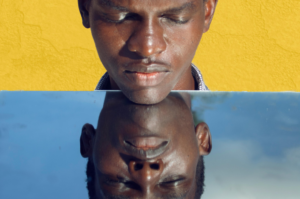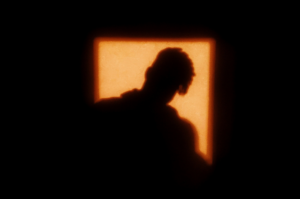
In these fourteen years your brother Sammy has been away, you’d hoped that time would do what it always does – create a chassis from memories. Now that you are back, you begin to see that memories are drunken things, they may stagger and wander off, but they always find their way home.
A lot has changed in Old Town, Kibokoni. Most of what used to be chalk-white colored buildings have other colors now – blue walls here and red doors there. Sewer water has formed puddles in the unending potholes, but your mother’s compound has refused to move on.
Looking back, it’s as if you have been rooted to this very spot, on the bottom-most staircase, all these years. You’ve watched mold invade the once clean walls, paint chip from the exterior of the house, the scantling of one of the windows break, and the death of your mother’s flower garden. Everything else – the off-white color of the house, the emptiness of the compound, and the bird chirps in the backyard – are still the same.
The year you lived with your mother, the one after your brother’s disappearance, you had sat on these broken steps, crying and plucking milky leaves from the yellow oleander in your mother’s garden. Now, you can’t remember whether you were mourning for your mother or brother.
***
Sammy had a way of reshaping realities into blissful fantasies. The day he told you how he would become an importer, he seemed so convinced, as if he had seen his future and was coming back to give a report. Importers had a lot of money because they bought cheap goods from first-world countries and sold them exorbitantly when they entered the country.
He would make good money, buy a mansion in Nyali, just by the beach and take you to live with him. There, you would never again hear your parents barking and barking. The excitement in his voice had been that of a child waiting for its mother to come home. You’ve not forgotten how his left lazy eye used to twitch when he was excited, but you’ve forgotten what his other eye looked like, just like his dreams have forgotten him.
Sometimes you wonder whether Sammy wanted all this to happen. After all, the day your mother caught your father in bed with the woman who has become your stepmother, it was Sammy who had told her about it. He had even given her the direction to the hotel, whose owner has since learned to ask for marriage certificates before he lets couples use his hotel rooms. Dust from the wrangles had blown all the way home and when your mother later demanded a divorce, your father threw his hands in the air and said, “Fine. This has been long over anyway.”
It was Sammy who had pulled your hand from your parent’s bedroom door where you’d stood, ear on it, listening to them that day. He dragged you to this very staircase, sat you down, squeezed your hand, and said it would be okay. They were miserable together. You wonder whether that is how he felt – miserable – before he abandoned everything.
***
You give a soft knock on the mahogany door. A small framed girl, almost your age opens it and smiles, revealing a set of browning teeth. She bites her top lip almost immediately before stepping back and miming you in with an exaggerated curtsey.
It’s the grave silence that greets you first before the mixture of Imperial Leather soap and lavender air freshener comes whirling into your nose. You pinch the tip of your nose and wonder whether your mother will tell you what she used to tell every visitor then – that the downstairs bathroom was not well designed since the slightest breeze had the entire floor smelling like the bathroom.
Your mother steps in from the kitchen, wiping her wet hands on her apron. She removes it and throws it to the armrest of the cobalt blue Chesterfield sofa, a replacement you think, of the old settees. You note that her cheeks are fuller now than they used to be, and her smile wider than the one in the photos she had sent.
She engulfs you in a hug. It’s a long suffocating thing, something that you’ve always wanted, but now, you realize, that it’s been stretched and pulled by life such that it’s a tardy surface thing. She pulls you towards the sofa like you are a toddler all over again and seats you next to her, fingers entwined.
***
Sammy liked football, and he loved Samuel Eto’o. You spent a bigger part of 2005 listening to him talk about Eto’o, and helped him glue posters of Drogba and Okocha on his bedroom walls. He’d framed a picture of Eto’o in his infamous number nine Barcelona jersey and nailed it to the centre of his room, opposite his bed, such that when he was lying on the bed, they appeared to be looking at each other.
A bigger part of that year was also spent in our mother’s backyard, helping our father and Sammy build a wooden goalpost. It was the year you discovered that you were a better goalkeeper than either of them. The year you broke an entire column of mother’s kitchen window panes, and she grounded the whole family from playing football for two weeks before your Dad had the window panes replaced.
Years later, your mother would stone the panes, and demolish the wooden posts with a sledgehammer. She would slit her wrists with pieces of the broken glass, toss herself up and down and beg God to bring her son back home or take her life. Whichever came first, she would accept it with open arms. But death is a harsh thing – it doesn’t obey the desperate voice of a willing caller.
***
You were eight when you began to lose your teeth, a late shedder. Sammy had come up with all manner of ideas to help you lose your teeth.
“When you eat guavas, you won’t even know when it comes out,” he had said. But it wasn’t the guavas that had uprooted the tooth from the gum. He had tied one end of a string to your tooth and another to his bedroom door knob and flung it. You didn’t register that the tooth was missing until you felt the gap with your tongue and tasted your blood.
Later, you would tell your mum that you’d keep the tooth. She would laugh and tell you that teeth were not a treasure you could keep, they belonged to the sun. Early the following morning, she would wake you and ask that you return the tooth to its rightful owner.
“By letting go of this old tooth, you’ll find a new and better one,” she would say, and watch you recite the prayer she had taught you. “Sun, take this tooth which is bad and give me another which is good.” You knew she was praying with you too, a silent request for your teeth to be perfect.
***
Sammy disappeared on the 21st of October, 2009. You remember because your father visited only on Tuesdays since the divorce. Sammy disappeared the day after your father visited. He left no note on those yellow sticky notes that used to decorate the inner part of the living room door, scribbled with your whereabouts like mother demanded of you. He’d dropped his school bag by his bedroom door and left as if he was going to come back and pick it up.
You can still see your mother standing by the landline, tapping her feet on the floor as she called your father later that evening, to inquire whether Sammy was at his place. It was the first they’d spoken since the divorce – a short conversation that had them rushing to the police station in the middle of the night.
The officers had asked now too familiar questions. What was he wearing? You said his uniform – black trousers, a checkered black and white shirt, and Bata shoes. They asked what his height was. Your mother said taller than you were, about a meter and sixty. They asked whether he was in the habit of going out in the evenings. You thought, not since the divorce, but your mother said no. They said his case was an easy one since your family had reported it early. They would find him in nothing flat. But they didn’t find him that night or the other. And at each approach of dusk, your parents had to refuel the passion of policemen with chai.
***
It wasn’t until four months later that you got the first clue of where Sammy might be.
Matano, the private investigator your parents hired, brought the black-and-white pictures to your mother. He had managed to trace Sammy to Jilib, Somalia.
“He must have been captured by the Al-Shabaab and transported via Lamu to Somalia,” he explained. He then spread the pictures of the boy on your dining room table, captured on either side of his face – his left eye lazy like Sammy’s and an oblong face like his.
In those four months before that small clue, you helped your mother to piece together snippets of ideas, which she shared with the officers and later the PI, on how your brother might have been kidnapped. You wondered whether he had been hurled into a fast-moving vehicle. Whether he was tricked by a foe or a friendly face. Perhaps a foe with a friendly face. You hated your mother’s insinuation that your father’s new wife might have something to do with it, but because Sammy was coming back, none of that mattered.
Matano’s budget for bringing your brother home was as hefty as his giant mold. Your mother was forced to sell off her office block in Mombasa Town to fund his trip to and from Somalia. The other half of the money would be deposited by your dad when Sammy got home safe. Matano left Mombasa airport on a Monday, almost five months after your brother’s disappearance. Like Sammy, you never saw him again.
***
It took three months after Matano for your father to stop dishing out money to police officers. Your mother gave long soliloquies about how your father wanted your brother to be forgotten, just like that. You have never forgotten how she said that word – just – as if your father had intended for this to happen in the first place.
The news of your brother would make news headlines again, a year after his disappearance. This time, it was from your father who had announced a grand prize of five million shillings to anyone that would find his son. The picture that graced the televisions was that of Sammy, clad in a Barcelona jersey, taken months before your parent’s divorce. In it, he had a wide grin – the grin of a boy grateful to a world that had done him well.
You remember the day the picture was taken very well. Your mother would not stop praising Sammy’s tackling skills. Once, he tackled your father to the ground, and your mother would not stop calling him Ronaldo. Your father had teased her for her poor football skills, and your mother had continued to laugh, cheer, and chant about how her son would be Ronaldo one day. You’ve wondered whether Sammy or your mother knew of your father’s promiscuity then; of how easy and fast things can change.
***
Your mother says she has prepared your favorite meal, biriyani with chilli. You smile a little. She asks whether you like something else now. Says it’s no bother for her to cook it. She only made biriyani because that’s what you said you liked two years ago when she called. You say, “Biriyani is fine, mama.”
She asks about campus. You say it’s good. Asks whether you have a boyfriend. You want to tell her that two times you’ve dated and twice it hasn’t worked out, but you say no. She asks about your father and your stepmother, and whether you’re treated fine in her house. She says “her house” as if to remind you that you will never belong there. You tighten your hold on her hands, which are still entwined, face down looking at the interlock, and nod. She blinks away tears and untangles her fingers from yours to wipe the corners of her eyes.
“I’m sober now. Three years,” she says. A sentence that she has not minded to recap since you began talking to her again, as if, the more she says it, the easier it will be for both of you to mend things. You remember what your father had called her all those many years ago before the court decided to hand you over to him – a guile and soulless woman.
She had flogged you. Flogged you until the wooden oar you used to stir ugali broke into pieces, and you had to nurse bruises and blisters on your back for weeks.
That Tuesday, when your father visited, he dragged your hand to his car and promised she’d never see you again. In the children’s court, they added, until she sobered up. You have never forgotten your mother’s face the day you came for your things; dark circles under her eyes, sniffling by your bedroom door – the look of a woman who had lost everything. Yet she didn’t get sober that year, or the next, or the next. And still, you waited.
***
Your mother had stopped being your mother long before Sammy disappeared. It was right after the divorce, around the time her drinking began. She turned your nightly staircase talks into complaints about husbands, marriage, that kind of thing. “Love”, she had said, “was a beautiful selfish and tragic thing,” and you’d sit there, wondering whether it was possible for something to be beautiful and ugly at the same time.
Today, you want to tell her that her beating had nothing to do with you wanting to stay away from her, even after her sobriety. It was the way everything else about her, except her rotund eyes, reminded you so much of Sammy. How you sometimes think Sammy would not forgive you for what you had done.
She holds your face in her hands. She’s not wiping her tears now. She says she’s sorry. You want to tell her that you are sorry too. You are sorry for so many things. You are sorry for setting Sammy’s clothes on fire – his jerseys. The photo of Eto’o that hang on the wall. You are sorry because you wanted your mother back. She wanted her son. You wanted a happy brother, wherever he might be. She wanted her son home, broken or happy. You wonder whether that’s why the sun didn’t answer this prayer like it did your teeth – because of the conflict of interest.
***
One day, your mother orders Sammy to uproot the errant snake plant growing on the first step, right where it joins the bare earth. You are sitting by the steps of your house, watching the moon and eating cassava chips. Sammy descends four steps to the bottom one.
“Uproot it with one hand,” she says.
“Why?” Sammy asks.
“Just do it,” your mother says. He pulls and tugs, but the plant is lodged, almost as if it has been cemented in the ground.
“Go help him,” your mother says and you skip jump the steps and reach Sammy. Within a few minutes of pulling, each holding the plant with a single hand, it comes out, causing both of you to fall on your buttocks. You both laugh and Sammy hugs you and shakes the dirt from the plant on your clothes.
Your mother shakes her head smiling and says, “It’s not that hard when you have a helping hand, is it?”
***
As you wipe tears from your mother’s face with your bare palms, you think, I’ll never have that again, and your mother’s pain is yours.
Photo by Dazzle Jam from Pexels










Kosi October 07, 2022 04:08
I started reading this story with a critical mind, thinking I'd hate it. But chai, turns out it's marvelous.